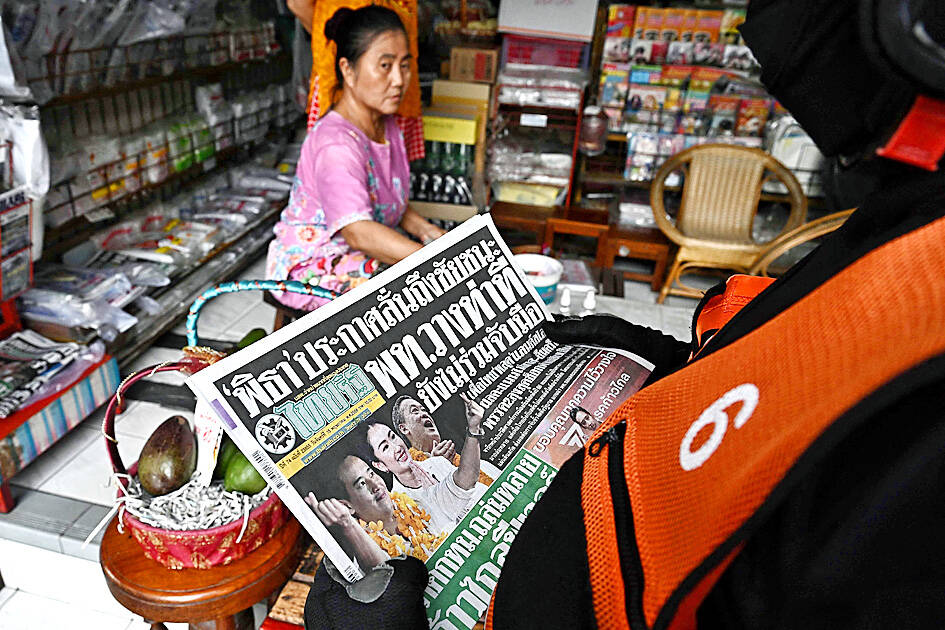Thailand’s economy expanded more than estimated in the first quarter as the nation benefited from a resurgence in tourism, although the outlook hinges on its ability to demonstrate political stability.
GDP grew 2.7 percent year-on-year in the three months to March, the Thai Office of the National Economic and Social Development Council (NESDC) said yesterday.
That is faster than the median 2.3 percent expansion estimated by economists in a Bloomberg survey. Output expanded 1.9 percent from the fourth quarter of last year.

Photo: AFP
While the return of tourists in the post-COVID-19-pandemic era supported first-quarter performance, the outlook depends on how smooth the transition of power is, after Sunday’s vote showed pro-democracy parties dominated the election.
With 99 percent of the votes counted, Move Forward Party and Pheu Thai Party were together projected to rack up 287 of the 500 seats in the lower house.
Even so, it is not yet clear whether the parties would be able to form a government even if early remarks from their leaders indicate a potential coalition.
In Thailand, 250 senators are appointed by the military who also get to vote for prime minister, along with the elected members of the lower house. That could determine whether the country would be politically stable, which is key to winning and keeping investor faith in the economy.
“I hope that after this election and we get a clear picture of politics and we get a clear picture of the economics numbers, the market would be more attractive,” Stock Exchange of Thailand president Pakorn Peetathawatchai said. “Once they see the recovery of all these industries, I’m quite certain that foreign funds will look at Thailand and see us as a more stable environment for investment.”
The baht advanced by the most in more than five weeks, climbing as much as 0.9 percent as election trends showed opposition parties were winning. The currency pared its gain to 0.5 percent, still keeping it among the top performers in emerging Asia this year.
Signs of an orderly formation of a new government appeared after Pheu Thai, which is linked to exiled former prime minister Thaksin Shinawatra, offered to support Move Forward’s leader, Pita Limjaroenrat, for prime minister. That follows earlier comments by Thailand’s army chief that there was “zero chance” of the Southeast Asian nation returning to a military rule in the event of post-election turmoil.
The NESDC maintained its forecast for tourist arrivals this year at 28 million.
Chinese travelers, who accounted for about 30 percent of visitors to Thailand before the pandemic, are returning again, with their numbers on course to hit 1 million a month starting in October.

STILL HOPEFUL: Delayed payment of NT$5.35 billion from an Indian server client sent its earnings plunging last year, but the firm expects a gradual pickup ahead Asustek Computer Inc (華碩), the world’s No. 5 PC vendor, yesterday reported an 87 percent slump in net profit for last year, dragged by a massive overdue payment from an Indian cloud service provider. The Indian customer has delayed payment totaling NT$5.35 billion (US$162.7 million), Asustek chief financial officer Nick Wu (吳長榮) told an online earnings conference. Asustek shipped servers to India between April and June last year. The customer told Asustek that it is launching multiple fundraising projects and expected to repay the debt in the short term, Wu said. The Indian customer accounted for less than 10 percent to Asustek’s

‘DECENT RESULTS’: The company said it is confident thanks to an improving world economy and uptakes in new wireless and AI technologies, despite US uncertainty Pegatron Corp (和碩) yesterday said it plans to build a new server manufacturing factory in the US this year to address US President Donald Trump’s new tariff policy. That would be the second server production base for Pegatron in addition to the existing facilities in Taoyuan, the iPhone assembler said. Servers are one of the new businesses Pegatron has explored in recent years to develop a more balanced product lineup. “We aim to provide our services from a location in the vicinity of our customers,” Pegatron president and chief executive officer Gary Cheng (鄭光治) told an online earnings conference yesterday. “We

LEAK SOURCE? There would be concern over the possibility of tech leaks if TSMC were to form a joint venture to operate Intel’s factories, an analyst said Taiwan Semiconductor Manufacturing Co (TSMC, 台積電) yesterday stayed mum after a report said that the chipmaker has pitched chip designers Nvidia Corp, Advanced Micro Devices Inc and Broadcom Inc about taking a stake in a joint venture to operate Intel Corp’s factories. Industry sources told the Central News Agency (CNA) that the possibility of TSMC proposing to operate Intel’s wafer fabs is low, as the Taiwanese chipmaker has always focused on its core business. There is also concern over possible technology leaks if TSMC were to form a joint venture to operate Intel’s factories, Concord Securities Co (康和證券) analyst Kerry Huang (黃志祺)

It was late morning and steam was rising from water tanks atop the colorful, but opaque-windowed, “soapland” sex parlors in a historic Tokyo red-light district. Walking through the narrow streets, camera in hand, was Beniko — a former sex worker who is trying to capture the spirit of the area once known as Yoshiwara through photography. “People often talk about this neighborhood having a ‘bad history,’” said Beniko, who goes by her nickname. “But the truth is that through the years people have lived here, made a life here, sometimes struggled to survive. I want to share that reality.” In its mid-17th to